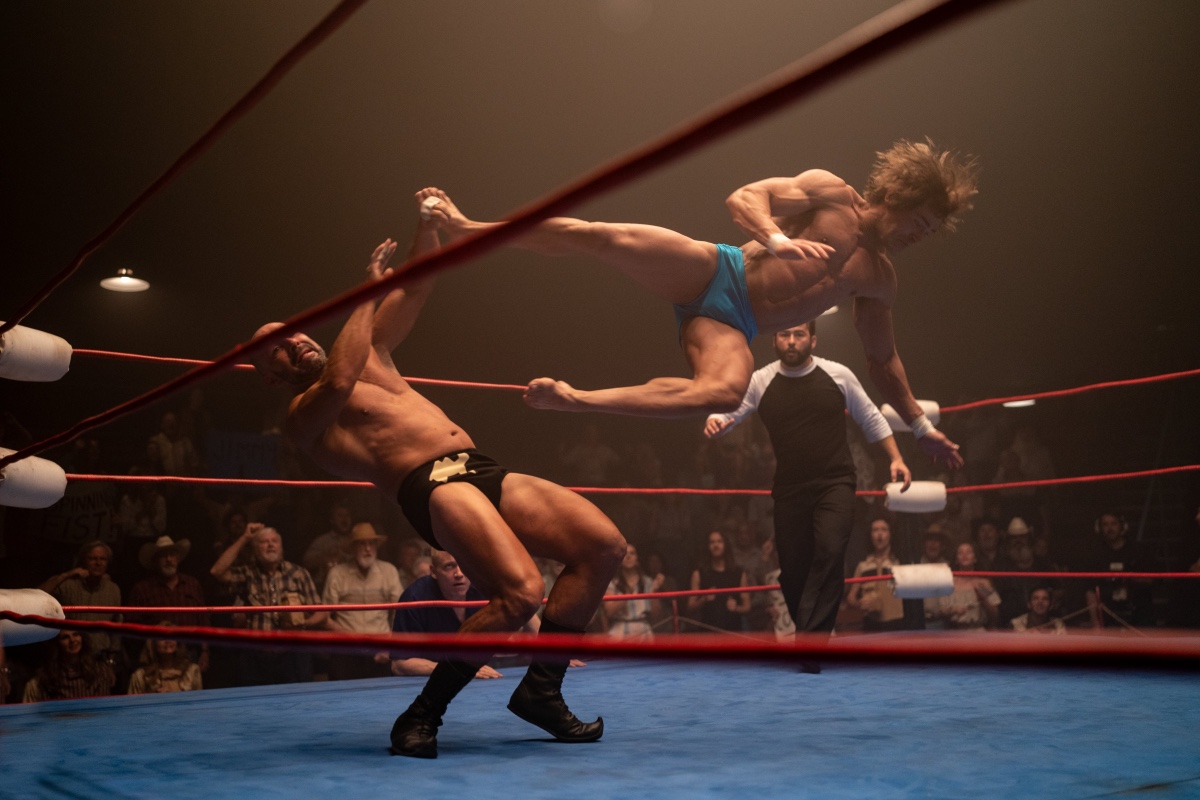‘The Iron Claw’s Powerful Performances Bring a True Tragedy to Life
3.5 tag team matches out of 5

Starring Zac Efron and Jeremy Allen White, The Iron Claw chronicles the true story of Kevin Von Erich (Efron), one of four brothers raised from birth to carry on their father Fritz (Holt McCallany)’s legacy of brutality and domination in the ring.
As Kevin works his way up in the wrestling world and seeks to claim the worldwide title his father couldn’t, his family is plagued by a series of brutal accidents that lead Kevin to believe his family is cursed. Whether you’re a professional wrestling diehard or a complete newbie, the story of the Von Erich family is a harrowing chronicle that makes perfect fodder for a fictionalized adaptation—there’s a near Shakespearian degree of tragedy to the relentless onslaught of grief and pain that followed the Von Erichs through their professional wrestling careers.
But in terms of the film’s structure, The Iron Claw moves at a dizzying, almost breakneck pace, often at the expense of its most potent emotional moments. Certainly, there’s a lot of ground to be covered in this multi-generational odyssey. The film begins with a young Fritz in his prime and follows all the way through the brothers’ wrestling careers and Kevin’s post-ring world—40+ years of living all sandwiched into a sub-two-and-a-half-hour runtime.
On the one hand, the sheer speed at which the film needs to move in order to juggle four brothers’ plot lines at once ensures that The Iron Claw is never an uninteresting or sluggish watch—the film (like the Von Erich’s titular signature move) is swift and brutal, never letting up once it gets going. There’s so much story to be told, though, that the film never finds time to slow down and linger in the quieter, more ruminative moments of such a devastating, action-packed story.
Certainly, the film goes to great lengths to highlight the differences between Fritz and Kevin, especially once his brothers begin dying. But while we see funeral sequences and explore brief moments of Kevin’s grief—most often when he’s spending time with his wife Pam (Lily James) and sons—The Iron Claw doesn’t commit itself to living in the heartbreak and tragedy of these moments like it should, and the emotional core of the film suffers for it.
Kevin’s story in particular (at least, the one the film presents) is rife with juicy emotional beats and character dynamics to explore. Though he was the first of his brothers to come up on the wrestling scene, his father never gives him the time of day or the chance to go after a world title himself until his brothers are dead or otherwise unable to compete. It’s a cruel, vicious irony, but instead of devoting time to following Kevin in quieter moments of solitude and introspection, The Iron Claw instead barrels from plot point to plot point, more interested in exploring the family business’ buyout than Kevin’s inner life.
Far too frequently, The Iron Claw opts for plot over pathos—a particularly frustrating decision considering just how cylical and one-note the wrestling matches themselves tend to be. Whether in Texas or Japan, it’s the same (admittedly very entertaining) shtick of ’80s graphics, brightly colored costumes, and signature wrestling camera smack talk—good fun, but hardly worth including in place of moments that might’ve otherwise been used to explore how Kevin attempts to cope with grief, or how (if at all) Fritz feels about his own ambition quite literally costing his sons their lives.
Fritz is perhaps the character most underserved by the film’s structure. Holt McCallany gives an intimidating performance that instills Fritz with the kind of terrifying presence that leaves him lingering over the other characters when he’s not around. There’s something particularly sinister about a father willing to pit brother against brother for the sake of family glory, and McCallany brings the requisite cruelty while also finding moments to hint at Fritz’s guilt (or lack thereof) about his sons’ lives. But as formidable as Fritz is, he’s given shockingly little screen time, much to the film’s detriment.
But while The Iron Claw may not make the most effective use of its runtime, the cast’s collective performances are undeniably staggering: All four Von Erich brothers are vibrant, multi-faceted characters who share an infectious, believable chemistry that makes their inevitable deaths all the more excruciating. As Kevin, Zac Efron gives a restrained, thoughtful performance—for all of the film’s struggles in terms of pacing, Kevin as a character is still an incredibly effective—without question the most moving, nuanced performance of Efron’s career.
His unsure, soft-spoken Kevin is contrasted by Harris Dickinson’s motormouthed David, Kevin’s younger brother who’s not *quite* as physically adept but whose showmanship and talent for smack talk on the mic wins him favor in their father’s eyes. Jeremy Allen White’s stony Kerry is the bad boy of the group, an ex-Olympic hopeful whose dedication to his craft sees him returning to the ring even after losing a foot in a horrific motorcycle accident. Their quartet is rounded out by Stanley Simons as Mike, the youngest Von Erich brother and the only one with no actual interest in wrestling. Though he’s roped into the family business (a move that eventually lands him in a coma), Mike’s true passion lies in music.
All four Von Erichs are clearly defined, thoughtfully written, and most importantly, feel like brothers—Efron, White, Dickinson, and Simons have cultivated a familial chemistry that acts as the film’s emotional backbone. It’s the closeness of their brotherhood and the genuine love between them that makes each death and injury all the more brutal. Though the script’s approach to handling the lengthy story renders the film less effective than it could’ve been, the quartet of performances at the heart of The Iron Claw wring maximum emotional potency out of the biographical tragedy.
(featured image: A24)
Have a tip we should know? [email protected]